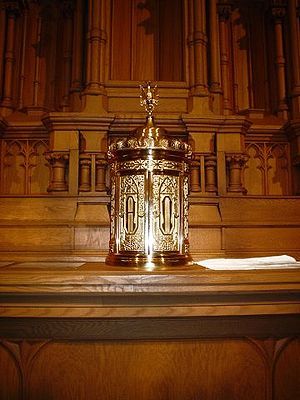“Love the Lord with all your heart, and with all your soul,
and with all your MIND”--Matt 22:37
December 8 is the Feast of the Immaculate Conception! It is the day in which we honor the fact that Mary was conceived without the stain of Original Sin. She was, from the very moment of her existence, a pure vessel, created to be the "tabernacle" of the Second Person of the Trinity.
Not sure why the Church, in her wisdom, always proclaims the Gospel reading in which the angel announces to Mary that she will conceive a Son.
That seems to confuse us into thinking that the Feast of the Immaculate Conception concerns how Mary conceived Jesus "immaculately" in her womb.
This is an incorrect explication of the Catholic view on sex. If it were true that Mary conceived Jesus "immaculately", that would suggest that Catholics view the other way to conceive (that is, the normal way) as not immaculate...or dirty. And, of course, that is NOT how Catholicism views sex. It is not dirty. It is holy. So for Catholics to proclaim that Mary conceived Jesus immaculately is to promote a falsehood: that the Church views sex as dirty.
So the correct understanding is that God set aside a special person to be a fitting vessel for His Son. And doesn't it make sense that the vessel which contains the Holy of Holies would be created to look, symbolically like this: (that is, pure, undefiled, beautiful and for one purpose only: to hold the Numinous. Not to hold any other thing)

rather than to look like this:

which is how all the rest of creation (human creation, that is) looks, symbolically, due to Original Sin. And each time we sin we become an unfitting vessel for Our Lord.
A non-Catholic who objected to the Church's teaching on the IC once posted this:
"hmmm...please tell me how exactly this works (in your mind). At your Eucharist you believe that the body of the Lord is taken entirely into your mouth...you are then the alleged vessel of the Lord, just as Mary was the vessel of the Lord (though the womb is perhaps a more "honorable" location than the mouth, esophagus, and gut). You are not sinless and the millions of other Catholics all over the world that participate in your Eucharist aren't sinless (and some are extremely depraved)....Let's say that, on average, one out of a hundred Catholics participates in the Eucharist each day and that the Lord's body persists for a minute in each case....we then have the Lord's body (cumulatively) residing in a non-sinless person 10 million minutes/day...as opposed to 400,000 minutes for Mary's pregnancy...so what gives? How is it so impossible for Jesus to spend about 400,000 minutes in the womb of a sinner and yet spend far, far more time in the mouths and guts of sinners each and every day?In other words, this non-Catholic is saying: if you say that it was fitting that Mary was sinless because she was the vessel which carried Our Lord, then how can Catholics, sinners all, claim to be receiving Him in the Eucharist?
The Catholic response is this: we indeed ought to be sinless, pure and undefiled, when we receive Him in the Eucharist. No one with mortal sin ought to approach the altar and receive Him. That's why the Sacrament of Reconciliation is offered every Saturday before Masses. And all of us with venial sins have our sins cleansed during the Penitential Rite at Mass.
So the Catholic Church is nothing if not consistent in her teachings.

For more in-depth study visit these websites:
Catholics Come Home
"Always
be prepared to give an answer to everyone who asks you to give the
reason for the hope that you have. But do this with gentleness and
respect" - 1 Peter 3:15